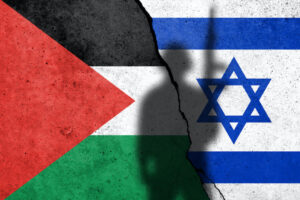
On the morning of 7th October 2023, Israel was attacked by the Palestinian group Hamas. The attack began in the morning with at least 3,000 rockets launched from the Hamas-controlled Gaza Strip against Israel. In parallel, some 2,500 Palestinian militants breached the Gaza–Israel barrier and massacred civilians in neighboring Israeli communities. At least 1,400 Israelis were killed, including 260 people at a music festival in Re’im. Unarmed civilian hostages and captured Israeli soldiers, including women and children, were taken to the Gaza Strip. Israel began conducting retaliatory strikes before formally declaring war on Hamas a day later.
another thing here is due to this Abraham Accords went for a toss and whatever hope for peace in the region is now gone.
As a finance student, I realize that this is a significant issue and will become big in one way or another, and was interested in writing about it. so this is my post about it.
This is not the first time both sides are at war.
Since its inception in 1948, Israel has fought in seven major wars:
- 1948–1949: Arab–Israeli War of 1948
- 1956: Suez Crisis
- 1967: Six-Day War
- 1973: Yom Kippur War
- 1982–2000: Lebanon War
- 2006: Second Lebanon War
- 2014: Operation Protective Edge
The Arab-Israeli conflict is an ongoing political and military conflict between the Arab world and the State of Israel. The conflict began in the late 19th century when the Zionist movement began to promote the establishment of a Jewish homeland in Palestine, which was then part of the Ottoman Empire.
The conflict has been marked by several wars, including the 1948 Arab-Israeli War, the 1967 Six-Day War, and the 1973 Yom Kippur War. The conflict has also been marked by numerous uprisings and intifadas, as well as ongoing violence between Israeli and Palestinian forces.
The Arab-Israeli conflict has had a profound impact on the Middle East. It has led to the displacement of millions of people, the destruction of infrastructure, and the loss of countless lives. The conflict has also contributed to regional instability and has exacerbated tensions between the Arab world and the West.
The consequences of the Arab-Israeli conflict are far-reaching and complex. The economic impacts of the Arab-Israeli conflict have been far-reaching and severe.
The direct costs of the conflict include the cost of military operations, the destruction of infrastructure, and the loss of human life. The World Bank estimates that the direct cost of the conflict to the Palestinian economy alone is $44.4 billion. The indirect costs of the conflict include the loss of investment, the decline of tourism, and the increase in trade barriers. The World Bank estimates that the indirect cost of the conflict to the Palestinian economy is $100 billion.
The economic impacts of the conflict have been felt most acutely by the Palestinians. The Palestinian economy is underdeveloped and heavily dependent on foreign aid. The conflict has made it difficult for the Palestinian economy to grow and has led to high levels of poverty and unemployment.
The economic impacts of the Arab-Israeli conflict have also been felt by other countries in the Middle East and by the global economy. The conflict has contributed to oil price volatility and has disrupted trade flows. The conflict has also made it difficult to resolve other conflicts in the region, which has further damaged the global economy.
The Arab-Israeli conflict is a major economic burden on the Middle East and the world. The conflict has led to the loss of trillions of dollars and has caused immense suffering to millions of people. A peaceful resolution to the conflict is essential for the economic prosperity of the Middle East and the world.
The Yom Kippur War had a significant impact on the global economy, particularly in the oil market. The war led to an oil embargo by Arab countries against the United States and its allies, which caused oil prices to quadrupole. This had a cascading effect on the global economy, leading to inflation, recession, and economic instability.
The oil embargo also had a significant impact on the developing world. Many developing countries were heavily dependent on imported oil, and the sharp rise in prices made it difficult for them to afford to import the oil they needed. This led to economic hardship and social unrest in many developing countries.
The Yom Kippur War also had a significant impact on the global financial system. The oil embargo led to a sharp decline in the value of the US dollar, and many banks and financial institutions experienced losses. This led to a loss of confidence in the global financial system and made it more difficult for businesses to raise capital.
So when I got all this information, I realized that even this time it will be not small and this may be big. Oil may be affected. After COVID-19, the global economy is already in bad shape. Rate hikes made it worse. Ukraine war was one major issue. it affects many economies in many ways. For African economies, some lost their food, and some big economy lost their fuel. oil price shot into the sky. As some things were expected to come to normal, this war was heading in the wrong way.

